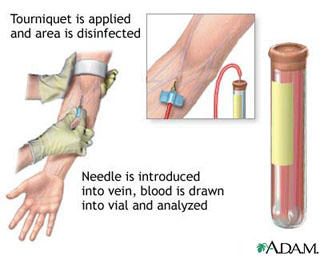How Herpes Blood Test is Done
August 15, 2010 by Joanna
Filed under Genital Herpes Resource
Herpes test are done to find the herpes simplex virus (HSV). A herpes simplex virus infection can cause small, painful sores that look like blisters on the skin or the tissue lining (mucous membrane) of the throat, nose, mouth, urethra, rectum and vagina. A herpes infection may cause only a single outbreak of herpes sores, but in many cases the person will have many more herpes outbreaks.
There are two types of herpes simplex virus: Herpes Simplex type 1 which causes herpes cold sores also called fever herpes blisters on the lips. Herpes Simplex type 1 is generally spread by kissing or by sharing eating utensils such as spoons or forks when herpes sores are present. Herpes Simplex type 1 can also cause herpes sores around the genital area.
The second type of herpes simplex virus is the herpes simplex type 2 which causes herpes sores in the genital area (genital herpes), such as on or around the vagina or penis. Herpes simplex type 2 also causes the herpes infection seen in babies who are delivered vaginally in women who have genital herpes. Herpes simplex type 2 is generally spread by sexual contact. Herpes simplex type 2 can also sometimes cause mouth sores.
In rare cases, herpes simplex virus can infect other parts of the body such as the eyes, ocular herpes, and the brain, herpes encephalitis.
 Tests for herpes simplex virus are most often done only for sores in the genital area. In rare cases, the test may be done using other types of samples, such as spinal fluid, blood, urine, or tears. To see whether sores are caused by Herpes Simplex Virus, different types of herpes tests may be done.
Tests for herpes simplex virus are most often done only for sores in the genital area. In rare cases, the test may be done using other types of samples, such as spinal fluid, blood, urine, or tears. To see whether sores are caused by Herpes Simplex Virus, different types of herpes tests may be done.
Herpes blood tests are generally used in cases where there are no visible herpes symptoms present. A herpes blood test works by detecting the presence of herpes antibodies. There is a possibility that the virus will not show up in a blood test and a positive result is not always indicative that a person has genital herpes.
Firstly, after the first exposure to herpes, a person may take several weeks to develop the antibodies that the tests look for. Usually, it takes two weeks to three months after exposure to herpes for antibodies to appear in the blood. Some herpes blood tests detect antibodies sooner than others. However, once antibodies are found they remain in the body for life. Also, antibodies may disappear with time, especially if the person has infrequent recurrences of herpes.
Secondly, blood tests cannot tell the difference between the two types of herpes virus, herpes simplex virus 1 and herpes simplex virus 2. For this reason, anyone seeking an accurate diagnosis of genital herpes must be sure to get a “type-specific” serologic test, which can accurately distinguish herpes simplex type 1 from herpes simplex type 2 antibodies. Most commercially available kit assays currently cannot make this distinction despite their claims. It should also be taken note that the herpes blood test cannot tell: which part of your body is infected (lips or genitals), whether you will develop symptoms of herpes or if your symptoms are due to herpes.
Blood tests can find antibodies that are made by the immune system to fight a herpes infection. Antibody tests are sometimes done but are not as accurate as a viral culture at finding the cause of a specific sore or ulcer. Antibody tests cannot tell the difference between a current active herpes infection and a herpes infection that occurred in the past. Because antibodies take time to develop after the first infection, you may not have a positive antibody test if you have just recently been infected. Some blood tests can tell the difference between Herpes Simplex Virus 1 and Herpes Simplex Virus 2.
It is thought that about half of adults in the United States likely have herpes antibodies.



